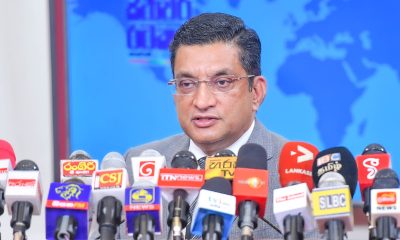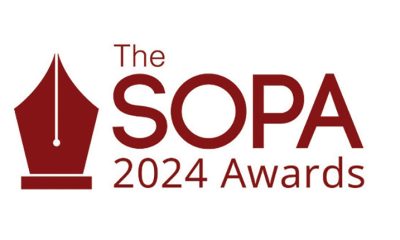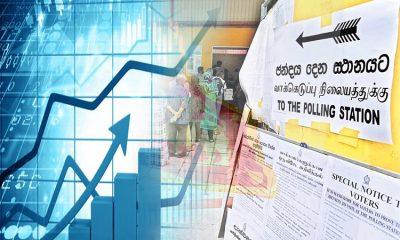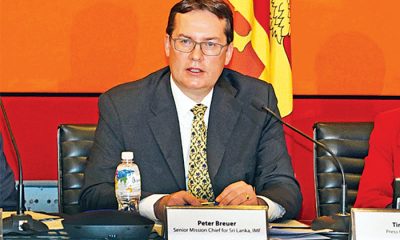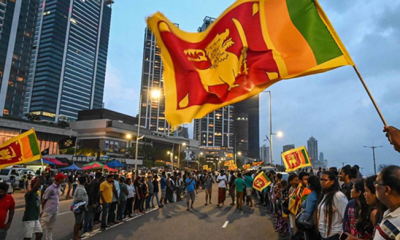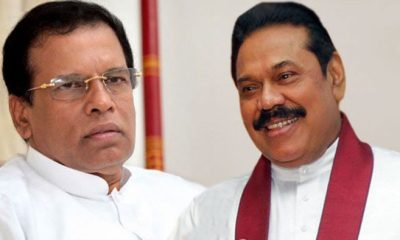Features
Sri Lanka Back as Donor Darling Ignores the BRICS

France’s Macron and the US Fish in the Indian Ocean
By Darini Rajasingham-Senanayake
COLOMBO. 23 August 2023 (IDN) —Sri Lanka continues to swing wildly between being a ‘Donor Darling’ flooded with foreign ‘aid’ and ‘advisors’ on the one hand to a ‘bankrupt’ pariah or outcast on the other.
Last year, the strategic Indian Ocean Island went from South Asia’s wealthiest nation with the best social and human development indicators to a beggar—humiliated and shunned by the ‘international community.’ This was after staging its first-ever Sovereign Default due to a Eurobond debt trap and purported lack of US dollars.
The default triggered rapid rupee depreciation and instantly beggared citizens amid a distracting trans-nationally networked, remote-controlled ‘Aragalaya’ protest operation led by social media influencers. Ironically, there was a blockade on fuel shipments to the country amid the United States Marine’s ‘Sea Vision’ training program for the Sri Lanka Navy.
Only India, the South Asian regional hegemon and good neighbor, was willing and able to help at the time. The narrative in the local and global corporate media echo chamber was that there was no fuel, food, fertilizer, medicines, or tourists to generate exorbitantly privileged and copiously printed US dollars to buy necessities. As the rupee plummeted, newly appointed US-backed President Ranil Wickremesinghe promised famine and 15-hour power cuts by promoting fear, out-migration, and brain drain from the country.
Yet, miraculously, like the Phoenix risen from the ashes a year later, Sri Lanka is back, having taken mana from heaven in the form of an International Monetary Fund (IMF) loan of just $2.9 billion to be disbursed over four years, that enabled the magical US dollars to flow again!
Last week, the island hosted the Indo-Pacific Environmental Security Forum (IPESF) at Colombo’s Shangri La Hotel, which faces South Asia’s busiest Port. More than 140 senior officers from foreign defense forces and top-level environmentalists from 28 countries in the Indo-Pacific took part at the confab overlooking Galle Face, the Aragalaya protest site. The four-day Environmental Security conference was hosted by the US Indo-Pacific Command (INDOPACOM), Sri Lanka Navy (SLN), and Sri Lanka Coast Guard (SLCG).
Although described as an ‘environmental security’ conference, the IPESF did not discuss the environmentally devastating impacts and economic costs of the global military business industrial complex, including 750 plus US military bases worldwide, their carbon emissions, and military exercises.
Environmental impacts of military exercises and war, like the Nordstream pipeline destruction or stranding and death of Pilot Whales and Dolphins due to war games as sonar systems of aircraft carriers disorient large sea creatures, were NOT on the agenda.
Climate Hypocrisy
The environmental impact of the NATO war machine and ongoing wars in Ukraine and Africa were the elephant in the room at Colombo’s Shangri-La Environmental Security Forum. Instead, trendy topics like Debt for Nature Swaps (DFNS), also called Environment, Social and Governance (ESG) bonds based on opaque carbon credit calculations, urbanization, ocean plastics, partnerships for climate resilience, data science in climate risk management, etc. were agenda items.
Two weeks before the IPESF, on July 28, French President Emmanuel Macron paid a midnight visit to Sri Lanka, where the OECD’s Club de Paris, represents Eurobond holders who were primarily responsible for the default, was involved in ongoing IMF debt restructuring negotiations and Numbers Game that are set to deepen the country’s debt bondage.
Macron, attempting to Greenwash Odious Debt and the most corrupt, opaque, and crime-ridden sector of the Western global financial system—Bond trading and derivatives—had been promoting the ‘New Global Financing Pact,’ launched last month in Paris. Based on opaque Carbon Credit calculations, the ‘Anthropocene’ climate catastrophe narrative was used to market DFNS, or Green and Blue Bonds.
Predatory bond traders, principal among them BlackRock, have debt trapped over 55 countries in the Global South during COVID-19 lockdowns. Hence, anti-corruption activists in Sri Lanka had called for an outright ban on government borrowing on private bond markets, which caused the Sovereign Default worst economic crisis, and for the country to seek membership in BRICS and the New Development Bank.
Macron, facing a rout in West Africa, was fishing in Sri Lanka’s troubled waters and promised to set up an office of the French Agency for International Development (AFD) in Colombo.
French fisheries fleets stationed in the Seychelles have been accused of over-fishing and Ocean Grabbing and impoverishing Indian Ocean littoral fisheries communities for decades. Indeed, a Brookings Institution report pointed the finger at French fleets for depriving Somalian Fishers of their livelihoods and forcing them into piracy.
Hot on the heels of departing Macron, a Japanese Government team arrived in Colombo to shower aid on the Ranil-Rajapaksa regime and restart a rapid rail project. A couple of months before Macron’s visit, CIA chief William Burns had paid a top-secret visit to the country, and the United States Ambassador at Large for Cyberspace and Digital Policy, Nathaniel C. Fick, was expected in Colombo from 17 to 23 August 2023, according to the Department of State. The Chinese were in the country earlier.
Aid Dependence and a Corruption Pandemic
Is Sri Lanka, which sits on major global trade, energy, and Submarine Data Cable routes, back again as a ‘donor darling’? The strategic island, long deemed an “unsinkable aircraft carrier in the middle of the Indian Ocean,” clearly suffers from a geostrategic ‘Resource Curse,” as well as aid-induced Dutch Disease and de-industrialization:
The Island, although rich in valuable marine resources and minerals including Graphite, Zircon, Titanium, etc., now depends on European Union GSP plus handouts to export underwear stitched by women and girls, who are working long hours in Free Trade Zone factories and servicing tourists to earn foreign exchange.
Since Independence in 1948, ‘Aid’ dependency has permeated and penetrated the government, military, business elite, policy-making, and civil society institutions, impeding industrialization and development, particularly the leveraging of valuable marine and mineral resources, including Graphite and Phosphates for fertilizer.
So, too, national law and order and investigative agencies and institutions have been penetrated and compromised due to dependency on foreign aid and experts and politicization. This has left the country vulnerable to trans-nationally networked crime, corruption, and being pumped, dumped, and de-stabilized during staged exogenous economic shocks sans proper investigations, analysis, and research.
Policies of promoting brain drain and skilled out-migration have exacerbated dependency on foreign aid, advisors, and consultants in a country already reeling from two years of COVID-19 lockdowns that had debilitated institutions and oversight mechanisms and enabled Digital Colonialism also visible in the IMF and World Bank debt numbers games.
Middle-Income Country Trap to “Make the Economy Scream”
In 2019, the country was also pumped and dumped by World Bank ‘experts’ when Sri Lanka was upgraded to an Upper Middle-Income Country (MIC). MIC status rendered the island ineligible to access concessionary loans available to less developed countries.
During two years of economically devastating COVID-19 lockdowns, successive incompetent and corrupt Ranil-Rajapaksa regimes related business cronies borrowed from private capital markets and hedge funds like BlackRock that charge predatory interest rates because of the World Bank’s MIC trap—leading to the first-ever default in 2022.
Early in its post-colonial history, Ceylon/ Sri Lanka, caught in Cold War regional refractions, was subject to various exogenous political and economic shocks; the country’s first socialist Prime Minister, who set about nationalizing ports, airports, and plantations, was assassinated, and his successor faced a coup. Insurrections in the shape of ’Jakarta Method’ operations, followed by a 30-year globally networked ‘ethnic conflict.’
Then came the mysterious 2019 Islamic State (IS)-claimed attacks at Easter Sunday on tourist hotels and churches and Chinese investments to make the ‘economy and society scream’ and encourage the obdurately independent natives to accept the Millennium Challenge Corporation (MCC), compact and the Status of Forces Agreement (SOFA), to enable US boots on the ground.
Amid the Aragalaya protest drama, default, and regime change operation last year, there were shades of President Nixon’s instructions to the Central Intelligence Agency (CIA) to make Chile’s ‘economy scream’ as a prelude to the overthrow of democratically-elected Leftist President Salvador Allende and the installation of dictator General Pinochet in 1973 during the Cold War.
As protests unfolded, the newly installed pro-Washington Ranil-Rajapaksa regime predictably promoted the myth that “there is no alternative to the IMF” and further Eurobond borrowing and debt colonialism –seemingly in preparation for an IMF Firesale of assets (prime coastal and highland lands, energy, transport, and telecom infrastructure) to benefit Eurobond traders.
Resilient in the Asian 21st Century?
However, once again, the resilient island appears to be back in business and humming along, but this time, the pumping and dumping of Sri Lanka as a new hybrid Cold War ramps up in the Indian Ocean with remote Over the Horizon (OTH), cyber and economic war operations for Full Spectrum Dominance (FSD), by a crashing superpower seems different.
During the first Cold War, there was still space for the Non-Aligned Movement (NAM) to declare the Indian Ocean as a “Zone of Peace,’ free of nuclear weapons and foreign military bases—led by the world’s first female Prime Minister and a Socialist, Sirimavo Bandaranaike.
However, since the Sovereign Default last year, Sri Lanka has not only lost Economic Independence and Policy autonomy to the Washington Twins and colonial Club de Paris, ironically on its 75th year of so-called Independence after being pumped and dumped by the World Bank into an MIC Eurobond debt trap in 2019.
Sri Lanka has lost its voice and independent thinking due to an ill-conceived policy of Brain Drain promoted by the foreign ‘Force’ backed by the Ranil-Rajapaksa government. This, in the wake of COVID-19 lockdowns and hacking of national institutions and oversight mechanisms, is promoting (Digital) neo-colonialism, also apparent in the debt restructuring Numbers Games being played by the IMF’s experts and consultants, including Lazard, Clifford, and Chance.
While Sri Lanka is being carved up for an IMF Firesale of strategic assets, by IMF’s chosen accounting and legal firms, few among the remaining local intelligentsia have thought to question the adequacy of the exorbitantly privileged and copiously printed US Dollar to measure the ‘wealth of nations’ as the world de-dollarizes. After all, the US has a deficit of $32 Trillion and counting and was downgraded by one of its own rating agencies recently.
Perhaps Sri Lanka’s resilience and the quick turnaround this time also has to do with being flanked by Asian Giants, China and India, in what has been termed the ‘Asian 21st century,’ as the BRICS emerging economies overtake the traditional G7 economic heavyweights while de-dollarizing fast.
Ironically, while France’s Macron sought an invite to the BRICS party in Johannesburg, South Africa, this week, Colombo’s Ranil Wickremesinghe has turned a blind eye to calls that Sri Lanka join the BRICS and New Development Bank.
*The writer is a social and medical anthropologist with international development and political-economic analysis expertise.
[IDN-InDepthNews]
Features
The invisible crisis: How tour guide failures bleed value from every tourist
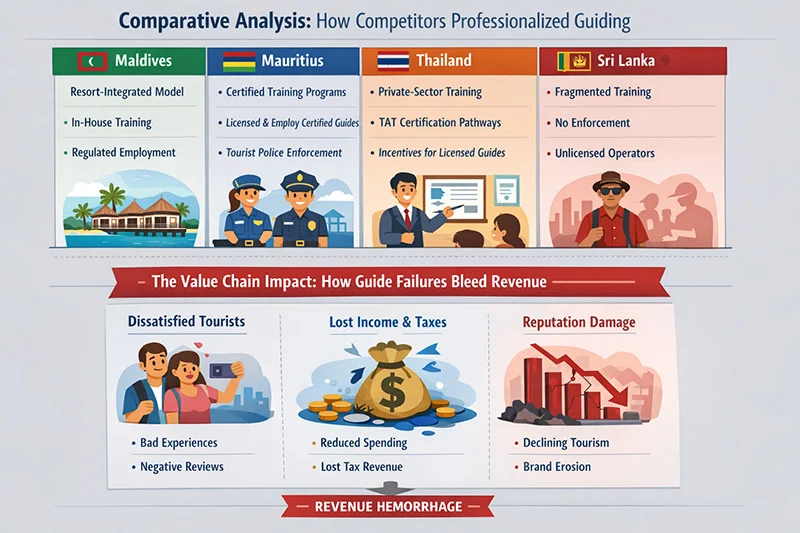
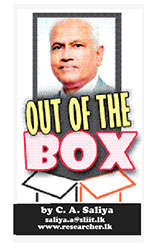 (Article 04 of the 04-part series on Sri Lanka’s tourism stagnation)
(Article 04 of the 04-part series on Sri Lanka’s tourism stagnation)
If you want to understand why Sri Lanka keeps leaking value even when arrivals hit “record” numbers, stop staring at SLTDA dashboards and start talking to the people who face tourists every day: the tour guides.
They are the “unofficial ambassadors” of Sri Lankan tourism, and they are the weakest, most neglected, most dysfunctional link in a value chain we pretend is functional. Nearly 60% of tourists use guides. Of those guides, 57% are unlicensed, untrained, and invisible to the very institutions claiming to regulate quality. This is not a marginal problem. It is a systemic failure to bleed value from every visitor.
The Invisible Workforce
The May 2024 “Comprehensive Study of the Sri Lankan Tour Guides” is the first serious attempt, in decades, to map this profession. Its findings should be front-page news. They are not, because acknowledging them would require admitting how fundamentally broken the system is. The official count (April 2024): SLTDA had 4,887 licensed guides in its books:
* 1,892 National Guides (39%)
* 1,552 Chauffeur Guides (32%)
* 1,339 Area Guides (27%)
* 104 Site Guides (2%)
The actual workforce: Survey data reveals these licensed categories represent only about 75% of people actually guiding tourists. About 23% identify as “other”; a polite euphemism for unlicensed operators: three-wheeler drivers, “surf boys,” informal city guides, and touts. Adjusted for informal operators, the true guide population is approximately 6,347; 32% National, 25% Chauffeur, 16% Area, 4% Site, and 23% unlicensed.
But even this understates reality. Industry practitioners interviewed in the study believe the informal universe is larger still, with unlicensed guides dominating certain tourist hotspots and price-sensitive segments. Using both top-down (tourist arrivals × share using guides) and bottom-up (guides × trips × party size) estimates, the study calculates that approximately 700,000 tourists used guides in 2023-24, roughly one-third of arrivals. Of those 700,000 tourists, 57% were handled by unlicensed guides.
Read that again. Most tourists interacting with guides are served by people with no formal training, no regulatory oversight, no quality standards, and no accountability. These are the “ambassadors” shaping visitor perceptions, driving purchasing decisions, and determining whether tourists extend stays, return, or recommend Sri Lanka. And they are invisible to SLTDA.
The Anatomy of Workforce Failure
The guide crisis is not accidental. It is the predictable outcome of decades of policy neglect, regulatory abdication, and institutional indifference.
1. Training Collapse and Barrier to Entry Failure
Becoming a licensed National Guide theoretically requires:
* Completion of formal training programmes
* Demonstrated language proficiency
* Knowledge of history, culture, geography
* Passing competency exams
In practice, these barriers have eroded. The study reveals:
* Training infrastructure is inadequate and geographically concentrated
* Language requirements are inconsistently enforced
* Knowledge assessments are outdated and poorly calibrated
* Continuous professional development is non-existent
The result: even licensed guides often lack the depth of knowledge, language skills, or service standards that high-yield tourists expect. Unlicensed guides have no standards at all. Compare this to competitors. In Mauritius, tour guides undergo rigorous government-certified training with mandatory refresher courses. The Maldives’ resort model embeds guide functions within integrated hospitality operations with strict quality controls. Thailand has well-developed private-sector training ecosystems feeding into licensed guide pools.
2. Economic Precarity and Income Volatility
Tour guiding in Sri Lanka is economically unstable:
* Seasonal income volatility: High earnings in peak months (December-March), near-zero in low season (April-June, September)
* No fixed salaries: Most guides work freelance or commission-based
* Age and experience don’t guarantee income: 60% of guides are over 40, but earnings decline with age due to physical demands and market preference for younger, language-proficient guides
* Commission dependency: Guides often earn more from commissions on shopping, gem purchases, and restaurant referrals than from guiding fees
The commission-driven model pushes guides to prioritise high-commission shops over meaningful experiences, leaving tourists feeling manipulated. With low earnings and poor incentives, skilled guides exist in the profession while few new entrants join. The result is a shrinking pool of struggling licensed guides and rising numbers of opportunistic unlicensed operators.
3. Regulatory Abdication and Unlicensed Proliferation
Unlicensed guides thrive because enforcement is absent, economic incentives favour avoiding fees and taxes, and tourists cannot distinguish licensed professionals from informal operators. With SLTDA’s limited capacity reducing oversight, unregistered activity expands. Guiding becomes the frontline where regulatory failure most visibly harms tourist experience and sector revenues in Sri Lanka.
4. Male-Dominated, Ageing, Geographically Uneven Workforce
The guide workforce is:
* Heavily male-dominated: Fewer than 10% are women
* Ageing: 60% are over 40; many in their 50s and 60s
* Geographically concentrated: Clustered in Colombo, Galle, Kandy, Cultural Triangle—minimal presence in emerging destinations
This creates multiple problems:
* Gender imbalance: Limits appeal to female solo travellers and certain market segments (wellness tourism, family travel with mothers)
* Physical limitations: Older guides struggle with demanding itineraries (hiking, adventure tourism)
* Knowledge ossification: Ageing workforce with no continuous learning rehashes outdated narratives, lacks digital literacy, cannot engage younger tourist demographics
* Regional gaps: Emerging destinations (Eastern Province, Northern heritage sites) lack trained guide capacity
1. Experience Degradation Lower Spending
Unlicensed guides lack knowledge, language skills, and service training. Tourist experience degrades. When tourists feel they are being shuttled to commission shops rather than authentic experiences, they:
* Cut trips short
* Skip additional paid activities
* Leave negative reviews
* Do not return or recommend
The yield impact is direct: degraded experiences reduce spending, return rates, and word-of-mouth premium.

2. Commission Steering → Value Leakage
Guides earning more from commissions than guiding fees optimise for merchant revenue, not tourist satisfaction.
This creates leakage: tourism spending flows to merchants paying highest commissions (often with foreign ownership or imported inventory), not to highest-quality experiences.
The economic distortion is visible: gems, souvenirs, and low-quality restaurants generate guide commissions while high-quality cultural sites, local artisan cooperatives, and authentic restaurants do not. Spending flows to low-value, high-leakage channels.
3. Safety and Security Risks → Reputation Damage
Unlicensed guides have no insurance, no accountability, no emergency training. When tourists encounter problems, accidents, harassment, scams, there is no recourse. Incidents generate negative publicity, travel advisories, reputation damage. The 2024-2025 reports of tourists being attacked by wildlife at major sites (Sigiriya) with inadequate safety protocols are symptomatic. Trained, licensed guides would have emergency protocols. Unlicensed operators improvise.
4. Market Segmentation Failure → Yield Optimisation Impossible
High-yield tourists (luxury, cultural immersion, adventure) require specialised guide-deep knowledge, language proficiency, cultural sensitivity. Sri Lanka cannot reliably deliver these guides at scale because:
* Training does not produce specialists (wildlife experts, heritage scholars, wellness practitioners)
* Economic precarity drives talent out
* Unlicensed operators dominate price-sensitive segments, leaving limited licensed capacity for premium segments
We cannot move upmarket because we lack the workforce to serve premium segments. We are locked into volume-chasing low-yield markets because that is what our guide workforce can provide.
The way forward
Fixing Sri Lanka’s guide crisis demands structural reform, not symbolic gestures. A full workforce census and licensing audit must map the real guide population, identify gaps, and set an enforcement baseline. Licensing must be mandatory, timebound, and backed by inspections and penalties. Economic incentives should reward professionalism through fair wages, transparent fees, and verified registries. Training must expand nationwide with specialisations, language standards, and continuous development. Gender and age imbalances require targeted recruitment, mentorship, and diversified roles. Finally, guides must be integrated into the tourism value chain through mandatory verification, accountability measures, and performancelinked feedback.
The Uncomfortable Truth
Can Sri Lanka achieve high-value tourism with a low-quality, largely unlicensed guide workforce? The answer is NO. Unambiguously, definitively, NO. Sri Lanka’s guides shape tourist perceptions, spending, and satisfaction, yet the system treats them as expendable; poorly trained, economically insecure, and largely unregulated. With 57% of tourists relying on unlicensed guides, experience quality becomes unpredictable and revenue leaks into commission-driven channels.
High-yield markets avoid destinations with weak service standards, leaving Sri Lanka stuck in low-value, volume tourism. This is not a training problem but a structural failure requiring regulatory enforcement, viable career pathways, and a complete overhaul of incentives. Without professionalising guides, high-value tourism is unattainable. Fixing the guide crisis is the foundation for genuine sector transformation.
The choice is ours. The workforce is waiting.
This concludes the 04-part series on Sri Lanka’s tourism stagnation. The diagnosis is complete. The question now is whether policymakers have the courage to act.
For any concerns/comments contact the author at saliya.ca@gmail.com
(The writer, a senior Chartered Accountant and professional banker, is Professor at SLIIT, Malabe. The views and opinions expressed in this article are personal.)
Features
Recruiting academics to state universities – beset by archaic selection processes?

Time has, by and large, stood still in the business of academic staff recruitment to state universities. Qualifications have proliferated and evolved to be more interdisciplinary, but our selection processes and evaluation criteria are unchanged since at least the late 1990s. But before I delve into the problems, I will describe the existing processes and schemes of recruitment. The discussion is limited to UGC-governed state universities (and does not include recruitment to medical and engineering sectors) though the problems may be relevant to other higher education institutions (HEIs).
How recruitment happens currently in SL state universities
Academic ranks in Sri Lankan state universities can be divided into three tiers (subdivisions are not discussed).
* Lecturer (Probationary)
– recruited with a four-year undergraduate degree. A tiny step higher is the Lecturer (Unconfirmed), recruited with a postgraduate degree but no teaching experience.
* A Senior Lecturer can be recruited with certain postgraduate qualifications and some number of years of teaching and research.
* Above this is the professor (of four types), which can be left out of this discussion since only one of those (Chair Professor) is by application.
State universities cannot hire permanent academic staff as and when they wish. Prior to advertising a vacancy, approval to recruit is obtained through a mind-numbing and time-consuming process (months!) ending at the Department of Management Services. The call for applications must list all ranks up to Senior Lecturer. All eligible candidates for Probationary to Senior Lecturer are interviewed, e.g., if a Department wants someone with a doctoral degree, they must still advertise for and interview candidates for all ranks, not only candidates with a doctoral degree. In the evaluation criteria, the first degree is more important than the doctoral degree (more on this strange phenomenon later). All of this is only possible when universities are not under a ‘hiring freeze’, which governments declare regularly and generally lasts several years.
Problem type 1
– Archaic processes and evaluation criteria
Twenty-five years ago, as a probationary lecturer with a first degree, I was a typical hire. We would be recruited, work some years and obtain postgraduate degrees (ideally using the privilege of paid study leave to attend a reputed university in the first world). State universities are primarily undergraduate teaching spaces, and when doctoral degrees were scarce, hiring probationary lecturers may have been a practical solution. The path to a higher degree was through the academic job. Now, due to availability of candidates with postgraduate qualifications and the problems of retaining academics who find foreign postgraduate opportunities, preference for candidates applying with a postgraduate qualification is growing. The evaluation scheme, however, prioritises the first degree over the candidate’s postgraduate education. Were I to apply to a Faculty of Education, despite a PhD on language teaching and research in education, I may not even be interviewed since my undergraduate degree is not in education. The ‘first degree first’ phenomenon shows that universities essentially ignore the intellectual development of a person beyond their early twenties. It also ignores the breadth of disciplines and their overlap with other fields.
This can be helped (not solved) by a simple fix, which can also reduce brain drain: give precedence to the doctoral degree in the required field, regardless of the candidate’s first degree, effected by a UGC circular. The suggestion is not fool-proof. It is a first step, and offered with the understanding that any selection process, however well the evaluation criteria are articulated, will be beset by multiple issues, including that of bias. Like other Sri Lankan institutions, universities, too, have tribal tendencies, surfacing in the form of a preference for one’s own alumni. Nevertheless, there are other problems that are, arguably, more pressing as I discuss next. In relation to the evaluation criteria, a problem is the narrow interpretation of any regulation, e.g., deciding the degree’s suitability based on the title rather than considering courses in the transcript. Despite rhetoric promoting internationalising and inter-disciplinarity, decision-making administrative and academic bodies have very literal expectations of candidates’ qualifications, e.g., a candidate with knowledge of digital literacy should show this through the title of the degree!
Problem type 2 – The mess of badly regulated higher education
A direct consequence of the contemporary expansion of higher education is a large number of applicants with myriad qualifications. The diversity of degree programmes cited makes the responsibility of selecting a suitable candidate for the job a challenging but very important one. After all, the job is for life – it is very difficult to fire a permanent employer in the state sector.
Widely varying undergraduate degree programmes.
At present, Sri Lankan undergraduates bring qualifications (at times more than one) from multiple types of higher education institutions: a degree from a UGC-affiliated state university, a state university external to the UGC, a state institution that is not a university, a foreign university, or a private HEI aka ‘private university’. It could be a degree received by attending on-site, in Sri Lanka or abroad. It could be from a private HEI’s affiliated foreign university or an external degree from a state university or an online only degree from a private HEI that is ‘UGC-approved’ or ‘Ministry of Education approved’, i.e., never studied in a university setting. Needless to say, the diversity (and their differences in quality) are dizzying. Unfortunately, under the evaluation scheme all degrees ‘recognised’ by the UGC are assigned the same marks. The same goes for the candidates’ merits or distinctions, first classes, etc., regardless of how difficult or easy the degree programme may be and even when capabilities, exposure, input, etc are obviously different.
Similar issues are faced when we consider postgraduate qualifications, though to a lesser degree. In my discipline(s), at least, a postgraduate degree obtained on-site from a first-world university is preferable to one from a local university (which usually have weekend or evening classes similar to part-time study) or online from a foreign university. Elitist this may be, but even the best local postgraduate degrees cannot provide the experience and intellectual growth gained by being in a university that gives you access to six million books and teaching and supervision by internationally-recognised scholars. Unfortunately, in the evaluation schemes for recruitment, the worst postgraduate qualification you know of will receive the same marks as one from NUS, Harvard or Leiden.
The problem is clear but what about a solution?
Recruitment to state universities needs to change to meet contemporary needs. We need evaluation criteria that allows us to get rid of the dross as well as a more sophisticated institutional understanding of using them. Recruitment is key if we want our institutions (and our country) to progress. I reiterate here the recommendations proposed in ‘Considerations for Higher Education Reform’ circulated previously by Kuppi Collective:
* Change bond regulations to be more just, in order to retain better qualified academics.
* Update the schemes of recruitment to reflect present-day realities of inter-disciplinary and multi-disciplinary training in order to recruit suitably qualified candidates.
* Ensure recruitment processes are made transparent by university administrations.
Kaushalya Perera is a senior lecturer at the University of Colombo.
(Kuppi is a politics and pedagogy happening on the margins of the lecture hall that parodies, subverts, and simultaneously reaffirms social hierarchies.)
Features
Talento … oozing with talent

 This week, too, the spotlight is on an outfit that has gained popularity, mainly through social media.
This week, too, the spotlight is on an outfit that has gained popularity, mainly through social media.
Last week we had MISTER Band in our scene, and on 10th February, Yellow Beatz – both social media favourites.
Talento is a seven-piece band that plays all types of music, from the ‘60s to the modern tracks of today.
The band has reached many heights, since its inception in 2012, and has gained recognition as a leading wedding and dance band in the scene here.
The members that makeup the outfit have a solid musical background, which comes through years of hard work and dedication
Their portfolio of music contains a mix of both western and eastern songs and are carefully selected, they say, to match the requirements of the intended audience, occasion, or event.
Although the baila is a specialty, which is inherent to this group, that originates from Moratuwa, their repertoire is made up of a vast collection of love, classic, oldies and modern-day hits.
The musicians, who make up Talento, are:
Prabuddha Geetharuchi:
(Vocalist/ Frontman). He is an avid music enthusiast and was mentored by a lot of famous musicians, and trainers, since he was a child. Growing up with them influenced him to take on western songs, as well as other music styles. A Peterite, he is the main man behind the band Talento and is a versatile singer/entertainer who never fails to get the crowd going.
Geilee Fonseka (Vocals):
A dynamic and charismatic vocalist whose vibrant stage presence, and powerful voice, bring a fresh spark to every performance. Young, energetic, and musically refined, she is an artiste who effortlessly blends passion with precision – captivating audiences from the very first note. Blessed with an immense vocal range, Geilee is a truly versatile singer, confidently delivering Western and Eastern music across multiple languages and genres.
Chandana Perera (Drummer):
His expertise and exceptional skills have earned him recognition as one of the finest acoustic drummers in Sri Lanka. With over 40 tours under his belt, Chandana has demonstrated his dedication and passion for music, embodying the essential role of a drummer as the heartbeat of any band.
Harsha Soysa:
(Bassist/Vocalist). He a chorister of the western choir of St. Sebastian’s College, Moratuwa, who began his musical education under famous voice trainers, as well as bass guitar trainers in Sri Lanka. He has also performed at events overseas. He acts as the second singer of the band
Udara Jayakody:
(Keyboardist). He is also a qualified pianist, adding technical flavour to Talento’s music. His singing and harmonising skills are an extra asset to the band. From his childhood he has been a part of a number of orchestras as a pianist. He has also previously performed with several famous western bands.
Aruna Madushanka:
(Saxophonist). His proficiciency in playing various instruments, including the saxophone, soprano saxophone, and western flute, showcases his versatility as a musician, and his musical repertoire is further enhanced by his remarkable singing ability.
Prashan Pramuditha:
(Lead guitar). He has the ability to play different styles, both oriental and western music, and he also creates unique tones and patterns with the guitar..
-

 Opinion6 days ago
Opinion6 days agoJamming and re-setting the world: What is the role of Donald Trump?
-

 Features3 days ago
Features3 days agoBrilliant Navy officer no more
-

 Features6 days ago
Features6 days agoAn innocent bystander or a passive onlooker?
-

 Features7 days ago
Features7 days agoRatmalana Airport: The Truth, The Whole Truth, And Nothing But The Truth
-

 Opinion3 days ago
Opinion3 days agoSri Lanka – world’s worst facilities for cricket fans
-

 Business7 days ago
Business7 days agoIRCSL transforms Sri Lanka’s insurance industry with first-ever Centralized Insurance Data Repository
-

 Business6 days ago
Business6 days agoAn efficacious strategy to boost exports of Sri Lanka in medium term
-

 Features4 days ago
Features4 days agoOverseas visits to drum up foreign assistance for Sri Lanka


